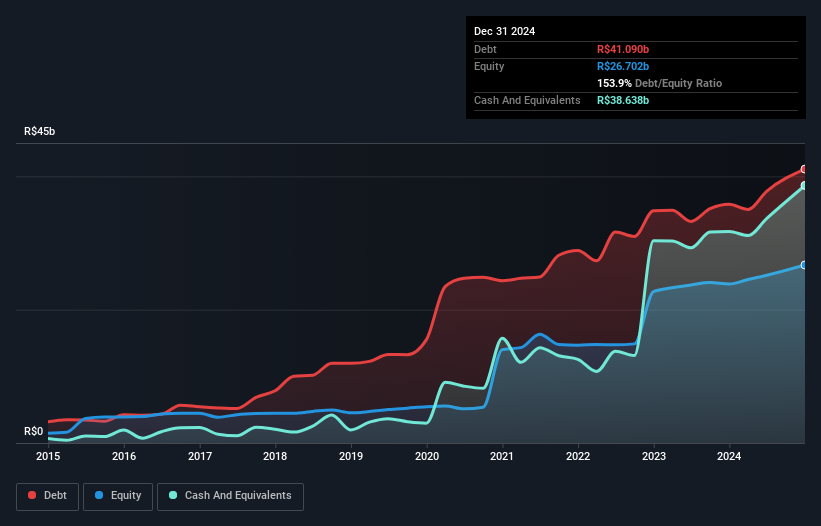Does Rede D'Or São Luiz (BVMF:RDOR3) Have A Healthy Balance Sheet?
Warren Buffett famously said, 'Volatility is far from synonymous with risk.' It's only natural to consider a company's balance sheet when you examine how risky it is, since debt is often involved when a business collapses. We can see that Rede D'Or São Luiz S.A. (BVMF:RDOR3) does use debt in its business. But is this debt a concern to shareholders?
Why Does Debt Bring Risk?
Generally speaking, debt only becomes a real problem when a company can't easily pay it off, either by raising capital or with its own cash flow. Ultimately, if the company can't fulfill its legal obligations to repay debt, shareholders could walk away with nothing. While that is not too common, we often do see indebted companies permanently diluting shareholders because lenders force them to raise capital at a distressed price. Of course, plenty of companies use debt to fund growth, without any negative consequences. The first thing to do when considering how much debt a business uses is to look at its cash and debt together.
What Is Rede D'Or São Luiz's Net Debt?
As you can see below, at the end of December 2024, Rede D'Or São Luiz had R$41.1b of debt, up from R$35.8b a year ago. Click the image for more detail. However, because it has a cash reserve of R$38.6b, its net debt is less, at about R$2.45b.

How Healthy Is Rede D'Or São Luiz's Balance Sheet?
The latest balance sheet data shows that Rede D'Or São Luiz had liabilities of R$17.9b due within a year, and liabilities of R$58.0b falling due after that. Offsetting this, it had R$38.6b in cash and R$10.9b in receivables that were due within 12 months. So it has liabilities totalling R$26.4b more than its cash and near-term receivables, combined.
This deficit isn't so bad because Rede D'Or São Luiz is worth a massive R$63.5b, and thus could probably raise enough capital to shore up its balance sheet, if the need arose. But we definitely want to keep our eyes open to indications that its debt is bringing too much risk.
Check out our latest analysis for Rede D'Or São Luiz
We use two main ratios to inform us about debt levels relative to earnings. The first is net debt divided by earnings before interest, tax, depreciation, and amortization (EBITDA), while the second is how many times its earnings before interest and tax (EBIT) covers its interest expense (or its interest cover, for short). The advantage of this approach is that we take into account both the absolute quantum of debt (with net debt to EBITDA) and the actual interest expenses associated with that debt (with its interest cover ratio).
Rede D'Or São Luiz has a low net debt to EBITDA ratio of only 0.28. And its EBIT covers its interest expense a whopping 19.7 times over. So you could argue it is no more threatened by its debt than an elephant is by a mouse. In addition to that, we're happy to report that Rede D'Or São Luiz has boosted its EBIT by 35%, thus reducing the spectre of future debt repayments. The balance sheet is clearly the area to focus on when you are analysing debt. But it is future earnings, more than anything, that will determine Rede D'Or São Luiz's ability to maintain a healthy balance sheet going forward. So if you want to see what the professionals think, you might find this free report on analyst profit forecasts to be interesting.
Finally, while the tax-man may adore accounting profits, lenders only accept cold hard cash. So it's worth checking how much of that EBIT is backed by free cash flow. Considering the last three years, Rede D'Or São Luiz actually recorded a cash outflow, overall. Debt is far more risky for companies with unreliable free cash flow, so shareholders should be hoping that the past expenditure will produce free cash flow in the future.
Our View
Rede D'Or São Luiz's interest cover suggests it can handle its debt as easily as Cristiano Ronaldo could score a goal against an under 14's goalkeeper. But we must concede we find its conversion of EBIT to free cash flow has the opposite effect. It's also worth noting that Rede D'Or São Luiz is in the Healthcare industry, which is often considered to be quite defensive. Looking at all the aforementioned factors together, it strikes us that Rede D'Or São Luiz can handle its debt fairly comfortably. On the plus side, this leverage can boost shareholder returns, but the potential downside is more risk of loss, so it's worth monitoring the balance sheet. Over time, share prices tend to follow earnings per share, so if you're interested in Rede D'Or São Luiz, you may well want to click here to check an interactive graph of its earnings per share history .
If, after all that, you're more interested in a fast growing company with a rock-solid balance sheet, then check out our list of net cash growth stocks without delay.
Have feedback on this article? Concerned about the content? Get in touch with us directly. Alternatively, email editorial-team (at) simplywallst.com.
This article by Simply Wall St is general in nature. We provide commentary based on historical data and analyst forecasts only using an unbiased methodology and our articles are not intended to be financial advice. It does not constitute a recommendation to buy or sell any stock, and does not take account of your objectives, or your financial situation. We aim to bring you long-term focused analysis driven by fundamental data. Note that our analysis may not factor in the latest price-sensitive company announcements or qualitative material. Simply Wall St has no position in any stocks mentioned.
 Index Options
Index Options State Street
State Street CME Group
CME Group Nasdaq
Nasdaq Cboe
Cboe TradingView
TradingView Wall Street Journal
Wall Street Journal